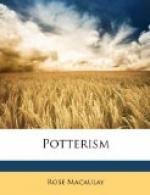5
Then, for nine days, we none of us thought or talked much about anything but the railway strike. The strike was rather like the war. The same old cries began again—carrying on, doing one’s bit, seeing it through, fighting to a finish, enemy atrocities (only now they were called sabotage), starving them out, gallant volunteers, the indomitable Britisher, cheeriest always in disaster (what a hideous slander!), innocent women and children. I never understood about these, at least about the women. Why is it worse that women should suffer than men? As to innocence, they have no more of that than men. I’m not innocent, particularly, nor are the other women I know. But they are always classed with children, as sort of helpless imbeciles who must be kept from danger and discomfort. I got sick of it during the war. The people who didn’t like the blockade talked about starving women and children, as if it was somehow worse that women should starve than men. Other people (quite other) talked of our brave soldiers who were fighting to defend the women and children of their country, or the dastardly air raids that killed women and children. Why not have said ‘non-combatants,’ which makes sense? There were plenty of male non-combatants, unfit or over age or indispensable, and it was quite as bad that they should be killed—worse, I suppose, when they were indispensable. Very few women or children are that.
So now the appeal to strikers which was published in the advertisement columns of the papers at the expense of ‘a few patriotic citizens’ said, ’Don’t bring further hardship and suffering upon the innocent women and children.... Save the women and children from the terror of the strike.’ Fools.
In another column was the N.U.R. advertisement, and that was worse. There was a picture of a railwayman looking like a consumptive in the last stages, and embracing one of his horrible children while his more horrible wife and mother supported the feeble heads of others, and under it was written, ’Is this man an anarchist? He wants a wage to keep his family,’ and it was awful to think that he and his family would perhaps get the wage and be kept after all. The question about whether he was an anarchist was obviously unanswerable without further data, as there was nothing in the picture to show his political convictions; they might, from anything that appeared, have been liberal, tory, labour, socialist, anarchist, or coalition-unionist. And anyhow, supposing that he had been an anarchist, he would still, presumably, have wanted a wage to keep his family. Anarchists are people who disapprove of authority, not of wages. The member of the N.U.R. who composed that picture must have had a muddled mind. But so many people have, and so many people use words in an odd sense, that you can’t find in the dictionary. Bolshevist, for instance. Lloyd George called the strikers Bolshevists, so did plenty of other people. None of them seem to




